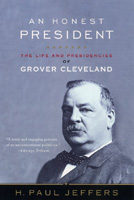 |
| ||||||||||||||||
 |
An Honest President: The Life and Presidencies of Grover ClevelandH. Paul Jeffers
Excerpt from An Honest President: The Life and Presidencies of Grover Cleveland Chapter One: Happy Bachelor No one who happened to be on Buffalo's Washington Street one evening in 1873 could recall what triggered the fistfight between the lawyers. It probably was an issue of Democratic Party politics. What everyone vividly remembered was that at some point leading up to the battle Mike Falvey called Grover Cleveland a liar. The next thing Falvey knew, he'd been banged into a gutter near Seneca Street. The combatants then raged as far as Swan Street, where an armistice was mutually proposed and promptly sealed by bellying up to the bar in Gillick's saloon. Except for politics and the practice of law, Grover relished nothing more than downing large steins of pale lager, especially when accompanied by heaping plates of sausages and sauerkraut and culminating with the smoking of a good cigar, in one of Buffalo's numerous beer gardens and saloons. The thirty-six-year-old bachelor enjoyed the roistering atmosphere of sand-covered floors, flickering gaslights, laughter, loud singing, card games, swapping tales of fishing and hunting, and, being a bachelor, the company of pretty women. "He was not a great talker," a friend recalled. "Once in a while something would start him going, and he would run on for half an evening, but for the most part he let others do the talking; he listened." His voice was "a little higher than expected from such a large man ... somewhat nasal, though not unpleasant [with] tenderness in it." At the time of the fisticuffs with Falvey, Grover had been a Buffalo resident for eighteen years. Man and place proved to be a good match. Bustling, uncouth, materialistic, hardworking Buffalo stood on the cusp of the rugged Western frontier and the conservative, refined East. It offered little in the way of surface graces but brimmed with people of common sense, tenacity, and stubborn character. These traits harmonized with Grover Cleveland's spirit of independence, conscientiousness, efficiency, and, above all, honesty, which had been handed down to him by ancestors, starting in New England. The first, Moses, for whom the city of Cleveland, Ohio, would be named, had left Ipswich, England, as an indentured apprentice and had landed in Massachusetts in 1635. The family name was of Saxon origin and taken from a region around Whitby, England, known for "clefts or cleves which abound there." It was variously spelled Cliveland, Cleivland, Clifland, Cleffland, and Cleaveland. The "a" was dropped in 1770 by Grover's grandfather, William, whose son Richard was born in Norwich, Connecticut, in 1804. A brilliant student, Richard Cleveland garnered high honors in Yale's class of 1824 and immediately began studying for the Protestant ministry in Baltimore. There he fell in love with twenty-two-year-old Ann Neal, daughter of a lawbook publisher. After continuing his studies at Princeton Theological Seminary, he was ordained in 1828 and accepted the pastorate of the First Congregational Church in Windham, Connecticut. He married Ann the following year. After four years in Connecticut and the births of Anna and William, they moved to Portsmouth, Virginia, where Mary Allen was born. Two years later, Richard accepted a pastorate in New Jersey and the couple settled in Caldwell in time for the arrival of their second son, Richard Jr. When a fifth child and third boy was born on March 18, 1837, he was named in honor of Richard's predecessor in Caldwell's Presbyterian pulpit, the Reverend Stephen Grover. Over the next few years the Cleveland children would total nine, each of whom would learn filial reverence, strict obedience, unquestioning belief in parental wisdom, and all the other tenets of the Holy Bible and Westminster Catechism. These verities and absolutes were intended to produce a keen sense of responsibility, ethical behavior, and trustworthy character. The effect on Grover was expressed in an essay he wrote at the age of nine. Its central point was that time was not to be wasted. Citing the examples of George Washington and Andrew Jackson, Grover wrote, "If we expect to become great and good men and be respected and esteemed by our friends we must improve our time when we are young. If we wish to become great and useful in the world we must improve our time in school." When Grover penned these thoughts, the Clevelands were no longer living in Caldwell but in Fayetteville, New York, a village near Syracuse, where Grover was enrolled in a school called the Fayetteville Academy. They remained nine years in a spot to which President Grover Cleveland would return for a brief visit some forty years later. Speaking then of his boyhood in "this pretty village," he cited "the many estimable benefits I received--my early education, the training of Sunday school, the religious advantages, the advantages of your social life. These are the things which have gone with me every step in life. And so, when in short intervals of freedom from the cares and duties of my office, my mind revels in retrospection, these early recollections are the truest, pleasantest, and brightest spots on which my memory lights." Always large for his age, Grover was during nine years in Fayetteville, in his sister Susan's eyes, "a little round-faced, blue-eyed boy," and in the view of Grover's schoolmates, "chuck full of fun." They found the youth they called Big Steve to be a prankster who was fond of sports, swimming, and tramping up the hills and around in the woods, and crazy about fishing. The latter would be such a lifelong passion that in 1902 he wrote a book on that subject and another of his joys, game shooting. "No man can be a completely good fisherman unless he is generous, sympathetic and honest," he wrote. "The manifestation of littleness and crowding selfishness in other quarters, and the over-reaching conduct so generally permitted in business circles, are unpardonable crimes in the true fisherman's code." An Honest President. Copyright © 2002 by H. Paul Jeffers. All rights reserved. The foregoing is reprinted by permission of HarperCollins Publishers, Inc. Find Items On Similar Subjects |
|||||||||||||||||||||
|
All prices subject to change and given in U.S. Dollars. |
All materials contained in http://www.LeadershipNow.com are protected by copyright and trademark laws and may not be used for any purpose whatsoever other than private, non-commercial viewing purposes. Derivative works and other unauthorized copying or use of stills, video footage, text or graphics is expressly prohibited. LeadershipNow is a trademark of M2 Communications, LLC. |
